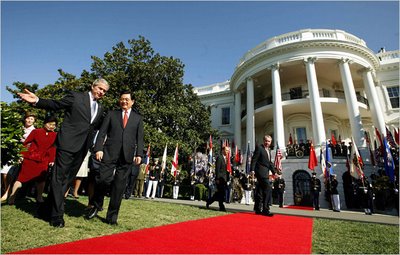
my parents and i rarely watch tv unless there's something newsworthy, but today we sat around the tele to watch coverage on the speech china's president hu made at the white house on thursday. he also stopped at yale to do a q&a. from AP:
'With protesters kept several blocks away, Hu told students and faculty at Yale University differences between China and the United States can be overcome by co-operation and their shared desire for peace.
But when asked whether his country's restrictions on political expression would cause unrest and hinder its economic growth, he said China is committed to democracy but has no plans to import other countries' policies.
"On one hand, we are ready and willing to draw on the useful experience of foreign countries into political involvement,'' he said.
"On the other hand, we will not simply copy the political models of other countries.''
from nyt:
'In a brief question-and-answer session after his speech, Mr. Hu was asked about restrictions on political freedom. The written questions from the audience were read by Ernesto Zedillo, the former president of Mexico and now the director of Yale's Center for the Study of Globalization.
"I believe that the development of the political infrastructure must be compatible with the economic foundation," Mr. Hu said, adding that he did not think it was fair to say there had been no political progress since modernization began in 1978.
...Minhua Ling, 25, a doctoral student in anthropology from Shanghai, said she thought Mr. Hu was more direct today than he had been at the White House.
"The message was very clear: China will do its own democracy in a very Chinese kind of way," Ms. Ling said.'
i generally share my parents' views on chinese human rights and development issues -- china's deep into a capitalist system, but there's no way china can instantly shift into a western democratic model with its deeply ingrained authoritarianism / confucianism; sociologically it would be disastrous. the problem for their leaders is: how can you prevent social rupture while shifting the economic system? leaders in china recognize that capitalism and democracy have benefits -- and their policies are attempting to make as smooth a transition (for most of their 1.3 billion people) as possible. in a few years, a few decades, i think we will be seeing an entirely different nation (middle class?), with a new mode of capitalism that the world has never seen before. a distinctly chinese one.
and this will be very interesting to watch.

3 comments:
this all makes sense. even without sweeping reforms, there are so many entrepreneurs and venture capitalists who make their way into the country on their own. my dad told me about a story, wherein a man (from the europe or u.s.?) decided to make a project out of connecting an entire village to the internet. this isn't unprecedented, i guess. you could probably find a similar story on worldchanging dot com.. :p
last week (4/14), the ny times published a front page story on one family's fight to be compensated for the death of their daughter; did you get chance to read it? the website has already taken the story offline, but i'll eventually dig it up from the library. "guojiatuo" is the name of the village. because the father is registered as a rural/migrant worker and not as an urban resident, his family's compensation was 1/3 of the compensation for the deaths of the daughter's 2 friends.
he threatened to take the case to court, by referencing the Chinese Constitution. apparently, however, the Consitution is not a very sturdy document for all citizens.
from what i gathered, it was the shipping company (whose truck crushed the girls) who refused to pay the family any more than 1/3, not any public or governmental entity. it seems like just another example of a dispute wherein the business-owner wishes to spend as little as possible.
within academia, there is talk of how law practices the world over are becoming increasingly "americanized", instead of "globalized", perhaps. this phenomenon is similar to what u.s. corporations have done during the past century. capitalism and democracy are theoretically the best systems on the plane. they're supposed to be self-regulating. and it would be wonderful to see them in place in china- i couldn't believe just how much creativity there is, bubbling up inside only one set of borders. but they're obviously not one-size-fits-all institutions..
confucianism is a more problematic thing, though.. it didn't occur to me just how much it can hinder a society.. until i heard a friend describe its havoc on Taipei and Taiwanese politics (lack of activism and empathy among most youths). these days, though, it seems more and more painfully obvious. i think you know what i mean- most chinese-american families expect all their children to become professionals. it's one thing to have high expectations of your offspring, to show concern for their well-being. it's another thing to believe that only a few options exist for them.
i think it's a shame the u.s. purports to be the most brilliant avatar of a working 'democracy', because it's clearly not. perhaps, if it were, then chinese government officials wouldn't beat around the bush so much when answering questions about reform. for example, china's GDP now surpasses britain's, and it is more of an 'asian tiger' [!!] than japan is. but it feels like we never really grew out of the cold war era... with all the unproductive finger-pointing that persists across the Pacific ocean.
the u.s. accuses china of having so much greenhouse gas emission, so many human rights violations, etc. at the same time, its media publish graphs and statistical figures that are sometimes misleading- one graph measures the ratio of fuel consumption to GDP. this obviously puts china at the top of the list, but of course it doesn't begin to describe how FEW chinese people (of its 1.3 billion) actually consume so-&-so much fuel.. or how much the average u.s. resident burns. i think that so much xenophobia is a shame, and so much significance placed in a nation's GDP. "you pull your own weight in the global arena, and i will then begin to consider pulling mine," is what seems to be on the minds of u.s. politicians. it's as if they can't grasp the concept of a developing country!!
the ny times also published a very interesting article about japan's shrinking middle class. especially because of Junichiro Koizumi's policies, a country that once prided itself on ironing away socioeconomic inequities is seeing more families dependent on welfare (with both parents working overtime with no compensation). the current government rationalizes that trickle-down economic policies work for society.. the ny times published this story within a few days that the sf chronicle published a story on increasing fuel consumption among japanese youth, and what this implies for the country that birthed the Kyoto Protocol.. japanese current events are interesting comparisons to chinese reform..
.. and once again, i have typed so much. thanks for indulging me. :p
wow ... thanks for the knowledge! it's a lot to chew on, but all very interesting. i don't really follow japanese econ, but the japan stats seem like what's going on, since koizumi policy.
right on about the xenophobia distributed to the general public in nice big doses. and for sure america incorporated knows what's up for them -- we better keep our hands in their pockets, etc. prez hu stayed at bill gates' monster/machine/mansion some point in his trip. :)
on mao zedong tip, i recall one thing mao DID do for china is get the country to international player status ... when he got nuclear bombs in the 1950s.
china- an endless subject. i remember reading a ny times review of 'house of flying daggers' where they call china 'a jiggling mass of sexual revolution' or something like that. !!! it's the like the new new world, or the new world recycled, or something.
about hu at the gates mansion- i heard that washington is the state that receives the largest amount of chinese investments. gee willikers.
Post a Comment